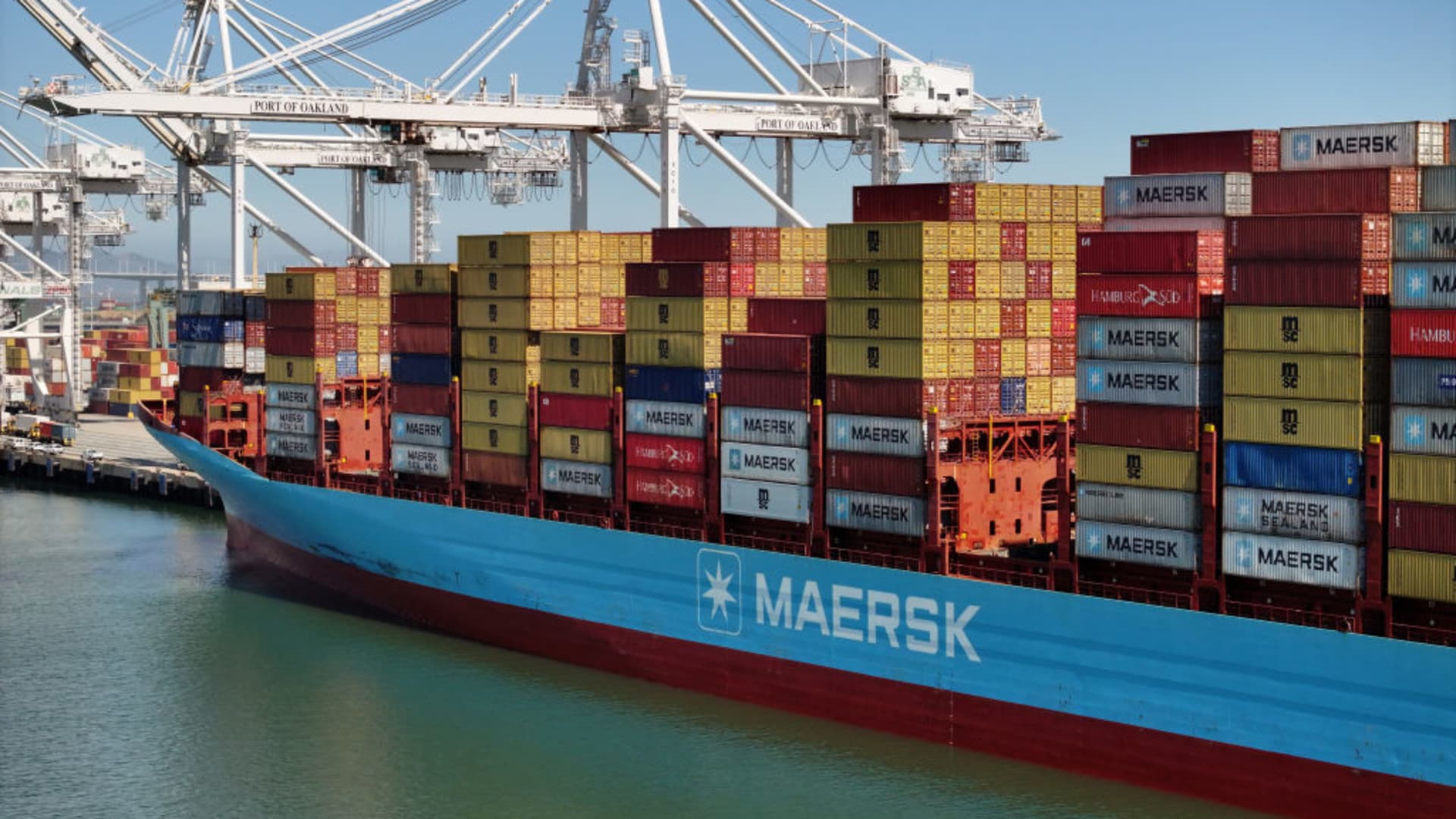Shipping giant Maersk, considered a barometer for global trade, is not seeing signs of a U.S. recession as freight demand remains robust, the company’s chief executive said Wednesday.
“We’ve seen in the last couple of years, actually, [the shipping container] market remaining surprisingly resilient to all the fear of recessions that there has been,” Vincent Clerc told CNBC’s “Squawk Box Europe” Wednesday, adding that container demand was generally a good indicator of underlying macroeconomic strength.
U.S. inventories — goods being stored before delivery or processing — “are higher than they were at the beginning of the year, but they are not at a level that is worrisome or that seems to indicate a significant slowdown right in the offing,” Clerc said, despite noting some unpredictability in numbers for companies replenishing stocks.
“We look also at purchase orders from a lot of retailers and consumer brands that need to import into the U.S. for the coming month of demand, and it seems still to be pretty robust … at least the data and the indicators that we’re having seem to point toward still some good level of confidence that the current consumption levels in the U.S. will continue.”
The last week has seen a sudden escalation in worries about a recession in the world’s biggest economy, the U.S., following a set of weaker-than-expected jobs data which has divided economists and market participants.
U.S. retail trade inventories — a measure of unwanted build — in May were up 5.33% from a year ago at $793.86 billion, according to the most recent release from the U.S. Census Bureau.
A report released by leasing platform Container xChange on Wednesday said indicators suggest inventories are higher than demand, meaning a less “prosperous time” in the coming months for container traders, the logistics market and retailers who stockpiled.
Maersk’s Clerc said the company had been surprised by the resilience of container volumes across the last few years, and said it expected that to continue in the coming quarters — with no indication the global economy is heading toward recessionary territory.
Chinese exports have been the engine behind strong container volumes as the global share of containers originating in or heading for China has increased, he continued.
In 2022, the Danish firm had a markedly more gloomy outlook, warning of a drag on demand from inflation, the threat of a global recession, the European energy crisis and the war in Ukraine.
A combination of those factors drove down freight rates in 2023, sending Maersk’s profits tumbling.
That trend was partially reversed this year amid soaring geopolitical tensions in the Red Sea, which led shipping firms to divert trade routes around the southern coast of Africa — extending journey times and taking capacity out of the global system.
Red Sea to cause further inflation
Clerc told CNBC Wednesday he expected Red Sea diversions to continue at least until the end of the year.
“That, of course, requires more capacity, more ships in order to move global trade around the world, and that has created some shortages here in the second quarter and in the third quarter that we’re dealing with at the moment,” he said.
“That means, in the short term, higher cost, and we have had to take on significant cost as a result of this, both in terms of having needing more ships and needing also more containers to do the job that is expected of us.”
If the situation persists, Maersk will see “significant inflation” in its cost base which it will need to pass on to customers, he continued, with Asia to Europe or U.S. east coast routes costing between 20% and 30% more.
The impact of capacity constraints in the short term has been positive for the Danish shipping giant’s margins and led to three profit upgrades in recent months, Clerc added.
Maersk on Wednesday reported a decline in year-on-year underlying profit to $623 million from $1.346 billion in the second quarter, and a dip in revenue to $12.77 billion from $12.99 billion.
While weaker on an annual basis, the company said ocean freight margins were “significantly better” than in the first quarter of 2024 and fourth quarter of 2023, with an earnings before interest and taxes margin of 5.6% versus -2% and -12.8% in those prior periods.
Maersk shares were 1.6% lower at 12:45 p.m. in London on Wednesday.

 Blog Post6 days ago
Blog Post6 days ago
 Accounting1 week ago
Accounting1 week ago
 Economics1 week ago
Economics1 week ago
 Personal Finance1 week ago
Personal Finance1 week ago
 Economics1 week ago
Economics1 week ago
 Personal Finance1 week ago
Personal Finance1 week ago
 Accounting1 week ago
Accounting1 week ago
 Finance1 week ago
Finance1 week ago























